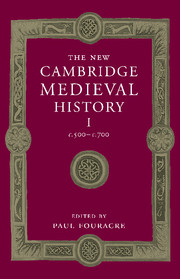Book contents
- Frontmatter
- Introduction: the history of Europe 500–700
- 1 The later Roman Empire
- 2 The Barbarian invasions
- 3 The sources and their interpretation
- PART I THE SIXTH CENTURY
- PART II THE SEVENTH CENTURY
- 11 The Byzantine empire in the seventh century
- 12 Muhammad and the rise of Islam
- 13 The Catholic Visigothic kingdom
- 14 Francia in the seventh century
- 15 Religion and society in Ireland
- 16 Christianity amongst the Britons, Dalriadan Irish and Picts
- 17 England in the seventh century
- 18 Scandinavia
- 19 The Slavs
- PART III THEMES AND PROBLEMS
- List of Primary sources
- Bibliography of secondary works arranged by chapter
- Index
- Frontispiece"
- Plate section"
- Map 3 Gaul/Francia in the sixth and seventh centuries"
- References
15 - Religion and society in Ireland
from PART II - THE SEVENTH CENTURY
Published online by Cambridge University Press: 28 March 2008
- Frontmatter
- Introduction: the history of Europe 500–700
- 1 The later Roman Empire
- 2 The Barbarian invasions
- 3 The sources and their interpretation
- PART I THE SIXTH CENTURY
- PART II THE SEVENTH CENTURY
- 11 The Byzantine empire in the seventh century
- 12 Muhammad and the rise of Islam
- 13 The Catholic Visigothic kingdom
- 14 Francia in the seventh century
- 15 Religion and society in Ireland
- 16 Christianity amongst the Britons, Dalriadan Irish and Picts
- 17 England in the seventh century
- 18 Scandinavia
- 19 The Slavs
- PART III THEMES AND PROBLEMS
- List of Primary sources
- Bibliography of secondary works arranged by chapter
- Index
- Frontispiece"
- Plate section"
- Map 3 Gaul/Francia in the sixth and seventh centuries"
- References
Summary
society, religion and the coming of christinanity
Christianity had originally spread westwards within the Roman Empire via the mosaic of cities around the Mediterranean; but Ireland lay outside that empire and had an entirely rural society, with no cities or even small towns, no urban lower and middle classes, no coinage, no mass production of goods, and very little trade. The Roman Empire was a hierarchically organised state, with an emperor at the top, and regular subdivisions down the geographical scale to the level of provinces, and within those provinces, the cities with their dependent territories. Ireland, however, was not unified politically; and although the highest-ranking overkings might have their overlordship recognised across an extensive area, this rested on recognition given by the kings of the many individual tribes or túatha (singular túath). These little túatha were the basic political entities, and people had no rights in another túath unless (as often happened) there was an agreement between that and their own túath.
Although different from the late Roman Empire, however, early Irish society was in many respects comparable with other early medieval societies. The basic unit was not the individual, but the kin group. This would be held responsible for the wrong-doing of one of its members, and for their protection. Besides its peace-keeping role, the kindred was also of fundamental importance in that most agricultural land was ‘kin-land’: although it could be farmed on an individual basis, it could not be granted away from the kin group, except with its consent. In addition to an individual’s blood relations, close bonds were formed through the widespread custom of fosterage.
- Type
- Chapter
- Information
- The New Cambridge Medieval History , pp. 397 - 425Publisher: Cambridge University PressPrint publication year: 2005
References
- 1
- Cited by

